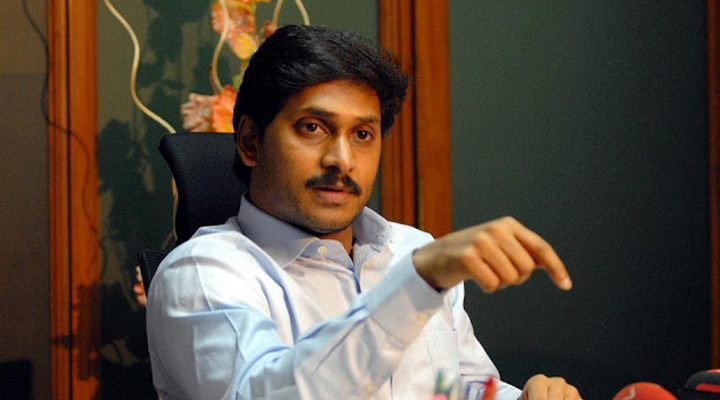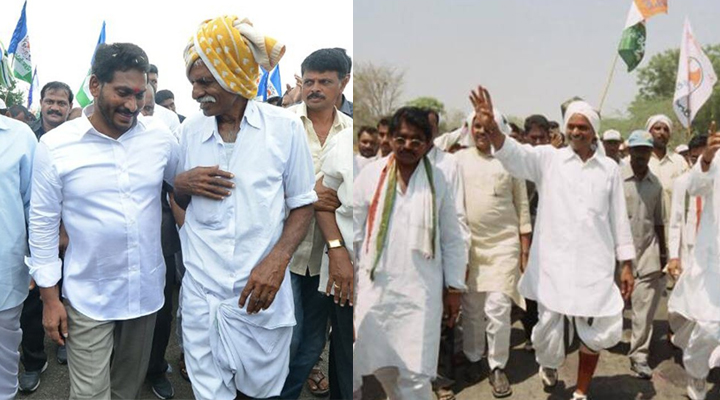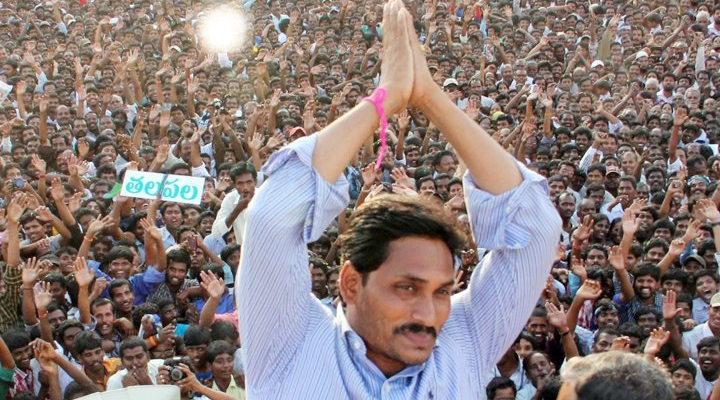Late Y S Rajasekhara Reddy, the former Chief Minister of Erstwhile Andhra Pradesh, as the leader of Andhra Pradesh State Congress Legislature Party, had begun his sixty-day, 1,500 km walkathon (padayatra) to best bit drought-related glitches, from Chevella in Ranga Reddy district (presently in Telangana state) on April 9, 2003. Incontestable, this has made him the most — he was raised up to the position of the Chief Minister of Andhra Pradesh state in 2004 elections. Following the treads of his father, YS Jagan Mohan Reddy, the Leader of Opposition in Andhra Pradesh State Assembly and the Chief of YSR Congress Party (YSRCP), has begun his momentous mass outreach program named Praja Sankalpa Yatra, on November 6, 2017. This has been a longterm line-up. Also, by the same token, a lengthy walkathon as linked to what his father had taken on. YS Jagan, on September 24, 2018, has reached the 3,000-kilometre breakthrough near Kotha Valasa in Vizianagaram district. In this milieu, I would like to express my opinion on YSR Jagan’s Political Campaign through Retail Politics.
Following the treads of his father, YS Jagan Mohan Reddy, the Leader of Opposition in Andhra Pradesh State Assembly and the Chief of YSR Congress Party (YSRCP), has begun his momentous mass outreach program named Praja Sankalpa Yatra, on November 6, 2017. This has been a longterm line-up. Also, by the same token, a lengthy walkathon as linked to what his father had taken on. YS Jagan, on September 24, 2018, has reached the 3,000-kilometre breakthrough near Kotha Valasa in Vizianagaram district. In this milieu, I would like to express my opinion on YSR Jagan’s Political Campaign through Retail Politics.
By motive, a political campaign is a systematized exertion that attempts to power the decision-making process inside a definite crowd. The political campaigns every so often denote electoral campaigns in democracies. Perceptibly, the representatives are chosen or plebiscites are decided in this process. In present-day politics, the most eminent political campaigns are focused on general elections to both states and the central.
Customarily, the message of the campaign contains the ideas that the contender wants to deliver to the voters. The inkling behind this is to get the support of those who agree with these ideas, thereby, getting a sustenance to run for a political position. The message being conveyed often consists of several talking points about their party’s manifesto — the policy issues. Besides, the points abridge the main ideas of the campaign. The campaigners, in order to craft a long-lasting imprint, repeatedly share their manifesto points, recurrently to the voters. To counter one contender’s or party’s campaigning, in many elections, the opposition party will try to get the candidate off message by taking along policy or personal questions that are not related to the talking points.
The campaigners, in order to craft a long-lasting imprint, repeatedly share their manifesto points, recurrently to the voters. To counter one contender’s or party’s campaigning, in many elections, the opposition party will try to get the candidate off message by taking along policy or personal questions that are not related to the talking points.
It is the accustomed and efficacious practice that in most campaigns, the message is preferred to hang onto a broad spectrum — to attract the most prospective voters. A message that is too narrow can estrange voters or weaken the candidate down with explaining details. Nevertheless, the message along would not fetch the victory. Even if the message is hewed judiciously, it does not guarantee the candidate’s triumph.
To the extent that Retail Politics is concerned, it is a style of political campaigning in which the candidate graces with his presence at local events, in order to bull voters on a moderate or individual basis. The familiar scenes of retail politics include greeting people warmly, kissing small kids, etc. In a nutshell, retail politics is a campaign-style in which candidates sell themselves and their strategies by talking to as many voters as possible. It is all about direct contact — meeting and talking to voters to appeal personally for their support.
This inclination has many paybacks, of which the principal benefit is — the people (voters) sense more affianced and more likely to support the candidate, as they feel softened through a confrontational meeting with the political contestant. To a great extent, it allows for interaction, wherein the voters can pose queries, engage with candidates, and come to feel that their concerns matter. What YS Jagan has been undertaking through his Praja Sankalpa Yatra, could be seen as a long-drawn-out retail political campaign. This strategy has categorically an added benefit. Of course, it was verified long back through YS Rajasekhar Reddy’s triumph in the 2004 general elections. At large, most voters will never get a chance to meet even their local MLA candidate. Absolutely, it would bring a smile on their faces, if they come about to meet a leader of his stature, competing for the position of the Chief Minister.
What YS Jagan has been undertaking through his Praja Sankalpa Yatra, could be seen as a long-drawn-out retail political campaign. This strategy has categorically an added benefit. Of course, it was verified long back through YS Rajasekhar Reddy’s triumph in the 2004 general elections. At large, most voters will never get a chance to meet even their local MLA candidate. Absolutely, it would bring a smile on their faces, if they come about to meet a leader of his stature, competing for the position of the Chief Minister.
Quite the reverse, one of the mesmerizing things about the progression of professional politics is the way that candidates and campaigns yoke new technology in ways that empower them to reach and meet voters. However, nothing can replace the original, and naturality cannot be conquered by the artificiality. It would obviously give a better feeling if we meet a person and talk to him personally than chatting over a video call. Is that not true? Retail politics, at its heart, is all about visibility and availability.
The personal meeting advantaged by retail politics has always worked for a twofold purpose. The contender could serve as a peer leader by clarifying the voters’ doubts. Besides, these voters would serve to publicise the main points through their word of mouth. The trademark of retail politics is — the shakeup politicians speak directly to voters, answering their questions in ways that make sense to them, then televised community centers drum a double punch.
As the Praja Sankalpa Yatra heads into its final weeks, let us hope that YS Jagan would get the better of conquest through his retail political campaign!
-Dr. Suman Kumar Kasturi













